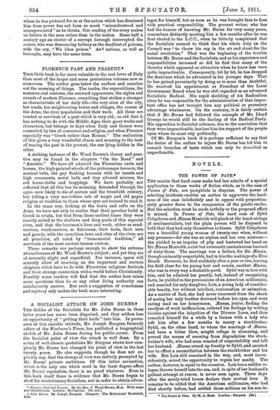A SOCIALIST ATTACK ON JOHN BURNS.t THE dislike of the
Socialists for Mr. John Burns in these latter years has never been disguised, and they seldom lose an opportunity of "getting their knife" into him. In pursu- ance of this amiable attitude, Mr. Joseph Burgess, formerly editor of the Workman's Times, has published a biographical sketch of Mr. John Burns during his public career. From the Socialist point of view the attack is well done. By a series of well-chosen quotations Mr. Burgess shows bow com- pletely Mr. Burns has changed his point of view in the last twenty years. He also suggests, though he does not ex- plicitly say, that the change of view was entirely prompted by Mr. Burns' private ambitions. Of this latter accusation, which is the only one which need in the least degree affect Mr. Burns' reputation, there is no proof whatever. Even in this book itself there is evidence that Mr. Burns began to shed his revolutionary Socialism, not in order to obtain advan- • Florence Past and Present. By the Rev. J. Wood Brown, M.A.. With maps and illustrations. London Rivington.s. [6s. net.] t John Ltd. Burns. By Joseph Burgess. Glasgow: The Reformers' Bookstall,
tages for himself, but as soon as he was brought face to face with practical responsibility. The present writer, who has had the honour of knowing Mr. Burns for very many years, remembers distinctly meeting him a few months after he was first elected to the L.C.C., when he bitterly complained that the Socialists seemed to think that his whole duty on the Council was "to throw his cap in the air and shout for the social revolution." That was the beginning of the trouble between Mr. Burns and the Socialists, and as his experience and responsibilities increased so did he find that many of the theories which appeared so attractive when he knew less were quite impracticable. Consequently, bit by bit, he has dropped the doctrines which he advocated in his younger days. That he has gained pecuniarily by doing so is more than doubtful. He received his appointment as President of the Local Government Board when he was still regarded as an advanced Socialistic Radical. His rapid shedding of his Radicalism since he was responsible for the administration of that impor- tant office has not brought him any political or pecuniary advantage whatsoever. On the contrary, it is fairly certain that if Mr. Burns had followed the example of Mr. Lloyd George he would still be the darling of the Radical Party. His opposition to Socialist schemes, due to the conviction that they were impracticable, has lost him the support of the people upon whom he must rely politically.
Of Mr. Burgess's book it is perhaps sufficient to say that the desire of the author to injure Mr. Burns has led him to commit breaches of taste which can only be described as unpardonable.






































 Previous page
Previous page